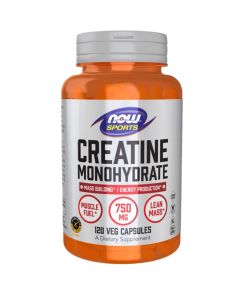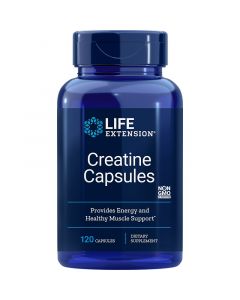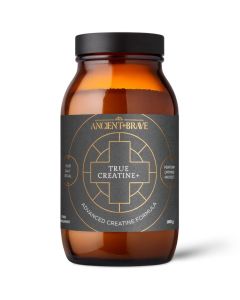
Does Creatine Make You Gain Weight?
What is Creatine?
Creatine is a naturally occurring compound found in muscle cells, as well as one of the most popular and well-researched supplements in the fitness world. It helps generate energy during high-intensity activities such as weightlifting or sprinting. While your body produces creatine on its own, it can also be obtained from dietary sources like meat and fish or through supplements[1].
There is ongoing debate about its impact on weight gain. Many people wonder whether creatine causes them to gain weight and, if so, whether this weight gain is from muscle, water, or fat. In this blog, we'll explore these questions in detail, helping you understand how creatine affects your body and when to be concerned about weight gain.
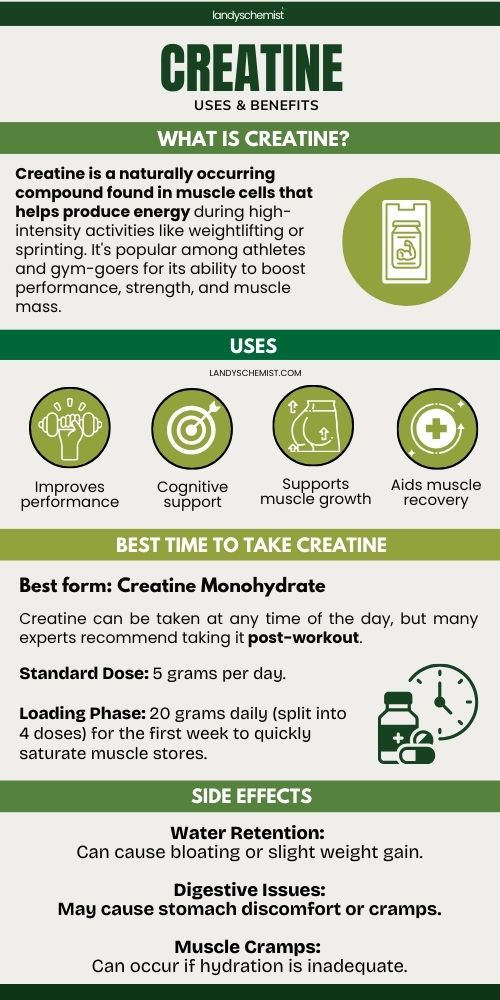
Creatine and Weight Gain
Why and How Creatine Makes You Gain Weight
One of the main reasons creatine is associated with weight gain is due to how it draws water into your muscle cells. Creatine increases the water content of your muscles, leading to what is commonly referred to as "water retention." This can result in an increase in your body weight, especially during the first week of creatine loading[2].
During the initial phase of creatine supplementation, where users take higher doses (around 20 grams per day), weight gain of 1 to 3 kilograms (2 to 7 pounds) within the first week is not uncommon. This is primarily due to water being drawn into the muscles to support the increased creatine storage[3]. However, this weight gain isn’t fat, and it shouldn’t be seen as a negative. The additional water in the muscles enhances their volume, making them look fuller, and helps you perform better in workouts, which can ultimately lead to increased muscle growth[4].

Common Misconceptions About Creatine and the Question of Water Weight
The association between creatine and "water weight" often leads to misconceptions. Many fear that the weight gain associated with creatine means they are getting fatter or bloated, but this is not the case. The water weight gained with creatine supplementation is stored inside the muscle cells, not under the skin[5], so it doesn’t contribute to a bloated or puffy appearance.
Moreover, as you continue taking creatine, the initial water retention will balance out, and the focus will shift to muscle growth, which is the main benefit of creatine supplementation. It's important to note that this water weight is part of the process of helping your muscles recover and grow stronger, so it's beneficial for anyone looking to improve athletic performance and build lean muscle[6]. Additionally, timing is often misunderstood—many wonder if taking creatine before bed affects results. To learn more about creatine timing and its benefits, check out our blog post about it here.
Gaining Muscle vs Gaining Fat
One of the biggest misconceptions about weight gain from creatine is that it leads to fat gain. In reality, creatine helps you build lean muscle mass, not fat. When you’re taking creatine and working out regularly, the weight gain you experience will likely come from the muscle you’re building due to increased workout intensity, rather than from fat.
Because creatine allows you to lift heavier weights and complete more repetitions, it enhances muscle protein synthesis, contributing to greater muscle hypertrophy (growth)[7]. As a result, the weight gain from creatine should be seen as lean muscle mass, not body fat.
It’s important to remember that gaining weight in the form of muscle is a healthy, positive outcome if you're aiming to improve your strength, athletic performance, or physique.
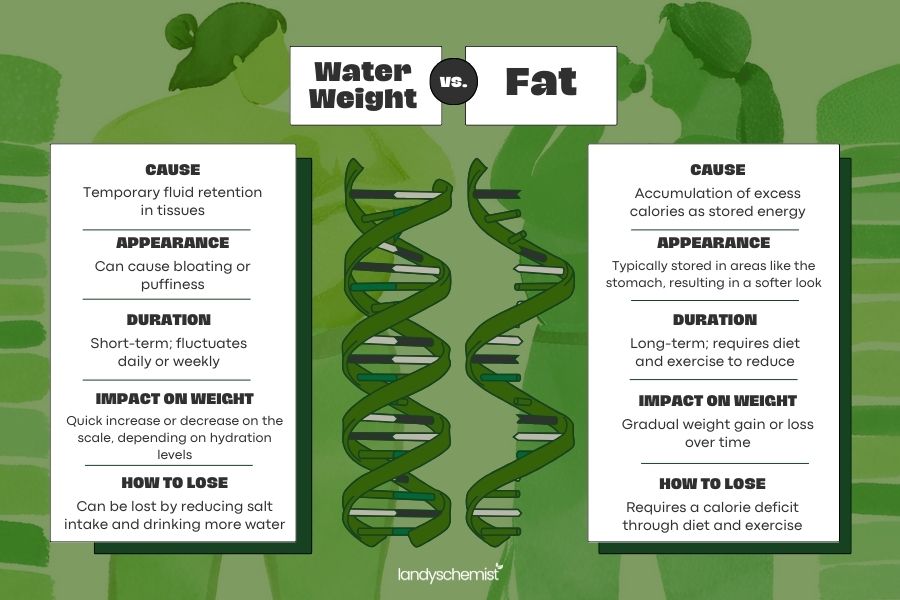
Best Creatine Supplements to Help You Build Lean Muscle
There are several forms of creatine available, but not all are equally effective. Here are some of the best types of creatine to consider if your goal is to build lean muscle:
NOW Foods Creatine Monohydrate Capsules
NOW Food's Creatine Monohydrate is one of the most effective and trusted forms of creatine. It improves muscle strength, endurance, and overall athletic performance. It’s affordable, and delivers the results you need for enhanced muscle mass.
Key Benefits:
- Improves muscle endurance and strength
- Enhances exercise performance and speeds up recovery
- Pure, fast-absorbing formula for optimal results
Life Extension Creatine Vegicaps
Life Extension Creatine Vegicaps offer a convenient, capsule-based way to increase your creatine intake, helping you improve strength and energy during workouts. Perfect for those who prefer capsules over powder, it’s an easy-to-take, effective supplement.
Key Benefits:
- Convenient capsule format for hassle-free supplementation
- Improves energy levels and strength during workouts
- Vegan-friendly and free from unnecessary fillers
Ancient + Brave True Creatine+ Powder
This powder provides pure, high-quality creatine that boosts energy and power during workouts. This powder-based supplement is a great option for those looking to enhance their training and build lean muscle.
Key Benefits:
- Elevates energy and power in high-intensity exercises
- Aids in muscle development and repair with added Taurine, Vitamin D, and Magnesium
- Premium-quality creatine for efficient absorption and effectiveness
When to Worry About Creatine Weight Gain?
While weight gain from creatine is normal, there are certain situations where it might be a concern:
- Excessive Water Retention: If you're noticing significant bloating or discomfort due to water retention, you might want to adjust your dosage. Gradually increasing your intake of creatine instead of doing a "loading phase" can help prevent excessive water retention.
- Unwanted Fat Gain: Creatine does not directly cause fat gain, but if you're not exercising regularly while taking it, you may be gaining fat due to excess calories or lack of activity. Make sure to combine creatine supplementation with a consistent workout routine to avoid this issue.
- Digestive Issues: Some people experience stomach discomfort or bloating when taking creatine. Switching to a different form, like creatine hydrochloride or micronised creatine, may help reduce these side effects[8].
If you're experiencing excessive or prolonged weight gain beyond the initial water retention period, or if you're feeling bloated or uncomfortable, it may be worth adjusting your dosage or speaking to a healthcare professional.
FAQ
How long does it take for creatine to start working?
Most people notice an increase in workout performance within 1 to 2 weeks of starting creatine supplementation[9]. Muscle gains and improved strength may take longer, depending on the intensity of your workout routine.
How fast does creatine make you gain weight?
Creatine can cause weight gain due to water retention within the first week, especially during the loading phase (when taking higher doses). You may see an increase of 1 to 3 kilograms (2 to 7 pounds) within this time, but it's important to note this weight gain is from water, not fat.
How long will creatine weight stay on?
The initial water weight gained from creatine will stay as long as you continue supplementation. However, once your body adapts and regular supplementation continues, the focus shifts to building muscle. If you stop taking creatine, the water retention will typically subside within a few weeks, and any weight from muscle mass will remain.
When is the best time to take creatine?
Creatine can be taken at any time of day, some even take creatine before bed or prefer to take it post-workout for muscle recovery, while others take it in the morning or with meals. Consistency is the key to seeing results.
Does creatine cause bloating?
Creatine can lead to initial water retention in muscle cells, making muscles appear fuller. However, it doesn’t cause bloating under the skin or a puffy look. If you experience discomfort, switching to a different form of creatine, like creatine hydrochloride, may help.
How long should I take creatine for?
There’s no need to cycle off creatine. It can be taken continuously as part of your supplement routine. However, staying hydrated and following the recommended dosage is important.
Does creatine help with fat loss?
While creatine doesn’t directly burn fat, it enhances workout performance, allowing you to train harder and burn more calories. This, combined with proper exercise and diet, can contribute to fat loss.
[1] https://www.ncbi.nlm.nih.gov/pmc/articles/PMC3407788/
[2] https://www.ncbi.nlm.nih.gov/pmc/articles/PMC155510/
[3] https://www.ncbi.nlm.nih.gov/pmc/articles/PMC8949037/
[4] https://www.ncbi.nlm.nih.gov/pmc/articles/PMC4551211
[5] https://www.ncbi.nlm.nih.gov/pmc/articles/PMC7871530
[6] https://www.ncbi.nlm.nih.gov/pmc/articles/PMC8949037/
[7] https://www.ncbi.nlm.nih.gov/pmc/articles/PMC8949037/
[8] https://www.healthline.com/nutrition/creatine-pros-and-cons

